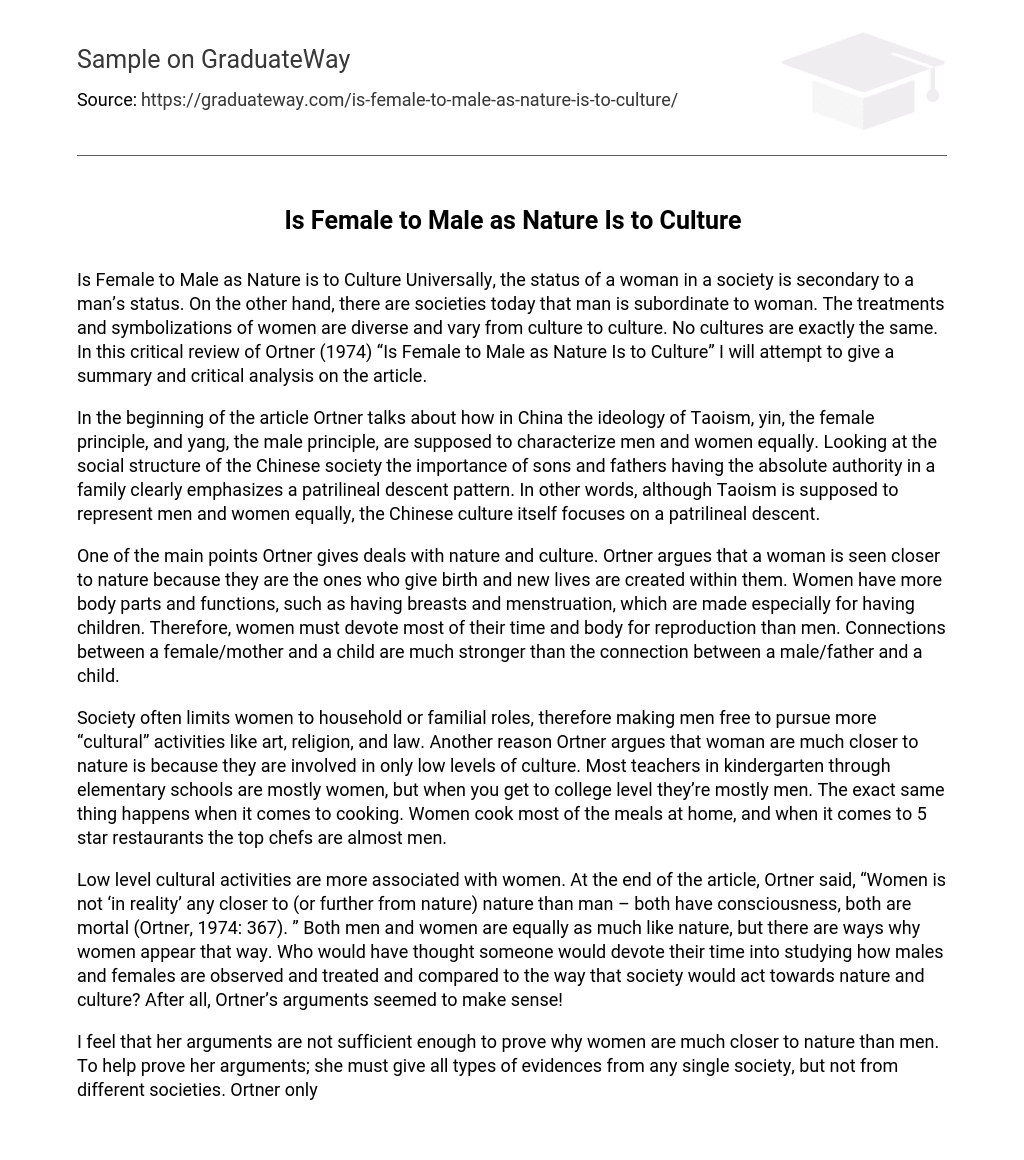Universally, the status of a woman in a society is secondary to a man’s status. On the other hand, there are societies today that man is subordinate to woman. The treatments and symbolizations of women are diverse and vary from culture to culture. No cultures are exactly the same. In this critical review of Ortner (1974) “Is Female to Male as Nature Is to Culture” I will attempt to give a summary and critical analysis on the article.
In the beginning of the article Ortner talks about how in China the ideology of Taoism, yin, the female principle, and yang, the male principle, are supposed to characterize men and women equally. Looking at the social structure of the Chinese society the importance of sons and fathers having the absolute authority in a family clearly emphasizes a patrilineal descent pattern. In other words, although Taoism is supposed to represent men and women equally, the Chinese culture itself focuses on a patrilineal descent.
One of the main points Ortner gives deals with nature and culture. Ortner argues that a woman is seen closer to nature because they are the ones who give birth and new lives are created within them. Women have more body parts and functions, such as having breasts and menstruation, which are made especially for having children. Therefore, women must devote most of their time and body for reproduction than men. Connections between a female/mother and a child are much stronger than the connection between a male/father and a child.
Society often limits women to household or familial roles, therefore making men free to pursue more “cultural” activities like art, religion, and law. Another reason Ortner argues that woman are much closer to nature is because they are involved in only low levels of culture. Most teachers in kindergarten through elementary schools are mostly women, but when you get to college level they’re mostly men. The exact same thing happens when it comes to cooking. Women cook most of the meals at home, and when it comes to 5 star restaurants the top chefs are almost men.
Low level cultural activities are more associated with women. At the end of the article, Ortner said, “Women is not ‘in reality’ any closer to (or further from nature) nature than man – both have consciousness, both are mortal (Ortner, 1974: 367). ” Both men and women are equally as much like nature, but there are ways why women appear that way. Who would have thought someone would devote their time into studying how males and females are observed and treated and compared to the way that society would act towards nature and culture? After all, Ortner’s arguments seemed to make sense!
I feel that her arguments are not sufficient enough to prove why women are much closer to nature than men. To help prove her arguments; she must give all types of evidences from any single society, but not from different societies. Ortner only points out how women are much closer to nature and how men are more associated with culture activities, but lacks to point out or give sufficient examples of how women can be more associated with “culture” activities and how men can be associated with “natural” activities. I feel that her writing has a hint of racism toward males.
Whether having her writing balanced out, she mostly concentrates on how women appears closer to nature and talks more about females than of males. Like many authors, Ortner writes within a historical and political context. Ortner’s choice of level follows from her structuralist theoretical position (Ortner, 1974: footnote). Work Cited Ortner, S. (1974). Is female to male as nature is to culture? In R. J. McGee and R. L. Warms (Eds. ), Anthropological theory: An introductory history (2nd Edition) (pp. 356-368). Mountain View, CA: Mayfield Publishing Company.





